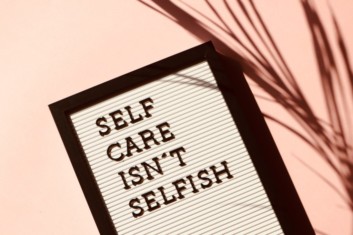On paper, Sarah’s life appeared to be one of envy — college graduate, a loving family, and an Instagram account depicting only laughter and love.
Sarah graduated in 2010 with a bachelor’s degree. As she prepared to tackle the real world with the promise of success and riches, she found herself in for a rude awakening.
Firstly, she had a massive student debt to pay off. Secondly, the world’s economy was in crisis—a crisis her generation would have to pay for. And thirdly, thanks to an impossibly competitive job market, her dreams of success soon turned into a nightmare that saw her moving back in with her parents and waiting tables.
As it turned out, the real world wasn’t so great after all.
And to make matters worse, the rise of social media ensured Sarah was constantly comparing herself to her peers, influencers, and celebrities — all of whom painted a picture of stark contrast to the reality she faced.
Sarah, along with her peers, were thrust into an extremely volatile and uncertain world. And without the life skills to manage, the interest on her debt accruing, and her prospects looking grim, she soon spiralled into a world of anxiety and depression —a reality she would struggle immensely to come to terms with.
When she finally landed a job that offered her hope for the future, she was confronted with a high-pressure working environment that stigmatized mental health and offered little real support to its employees. An environment she resented as it fuelled her anxiety and depression as well as feelings of isolation while making it seemingly impossible for her to be productive or shine in her new role. A role she so desperately wanted to be successful in.
Sarah’s story is not unique. It is a story shared by millions of millennials in North America and around the globe.
Anxiety and depression amongst millennials is a full-blown epidemic. The consequences of which — as outlined above — are catastrophic. But it gets worse.
According to a report by Well Being Trust, more millennials are dying “deaths of despair” than any generation to precede them.
“Deaths of despair” include alcohol and drug-induced fatalities as well as suicide. And they accounted for more than 152,000 lives in 2017 — the highest number ever recorded and more than double that in 1999.
While many are quick to label millennials snowflakes, when we study the facts, the evidence is clear as to why such an epidemic exists.
There has been a meteoric shift in the world. Technology has permanently changed the landscape in which we live and work, ensuring we are living in a busier and more distracted world than ever.
The millennial generation is the first to be faced with such unchartered waters. And with heavy scrutiny from older generations and not a playbook insight, they would have no choice but to spend their formative working years having to figure it out alone.
And there were consequences. Namely, their mental health, which they too would also have to figure out on their own.
Technology, in itself, can be enough to justify the cause. Still, when compounded with several other factors, we can begin to get a feel for why such turmoil and trauma looms over an entire generation.
Here are just a few of the reasons why Millennials are struggling with their mental health both at home and in the workplace:
Financial Stress
The wake of the global financial crisis promises that not only will millennials have to pay for the mistakes of their predecessors, but they also stand to be the first generation ever not to outearn their parents.
Also, student loan debt, healthcare, childcare, expensive rents, uncertainty, and rising house prices have millennials extremely stressed about both their financial prospects and future.
Burnout
Known as “burnout generation”, the economy, work environment, lack of available resources for help, increasing workloads, longer hours, and social media are all contributing factors to burnout becoming a growing problem in today’s workplace.
Perfectionism
With close ties to anxiety and depression, a study from Curran attributes rising levels of perfectionism to social media use, which can lead to an overall dissatisfaction with appearance and social isolation.
Further, a deep desire to succeed both personally, financially, and professionally sees millennials place themselves under exceedingly high pressure with often unrealistic goals, which, more often, spirals them into a world of anxiety and depression.
Loneliness
An epidemic within an epidemic, and a double-edged sword, those that are anxious or depressed, can begin to experience loneliness. In contrast, those that are lonely can begin to experience symptoms of anxiety and depression.
A survey by YouGov found millennials were more likely to feel lonely than any previous generation.
Technology
As mentioned, millennials are the first generation to witness such a seismic shift in how we live our lives.
Sensory overload and increasingly more time spent on their phones are resulting in a loss of real connections, which also increases the level of loneliness and despair many millennials report.
How is the millennial mental health crisis affecting the workplace?
While they are indeed suffering, millennials have a high level of awareness and, as a result, high standards as to what they are willing to accept in a work environment.
So far, employers are not meeting these expectations. And it’s costing them.
A study by Mind Share, found that 50% of millennials have left a job for mental health reasons. The figure increases to 75% for Gen Z, further highlighting the serious implications facing employers if not tackled pro-actively and as a matter of urgency.
Millennials attribute much of their mental health struggles to the workplace. And they will continue to fight for better, more supportive work environments while continuing to distance themselves from companies unwilling to tear down stigmas and create a supportive company culture.
That same study by Mind Share found;
- Millennials are 3.5 times more likely than baby boomers to believe their work or workplace environment was a contributing factor to their mental health conditions. Millennials were 3 to 4 times more likely to experience anxiety symptoms at work when compared to baby boomers. The majority of respondents didn’t believe their company supported mental health at work.
The current cost of the mental health epidemic to employers:
If you are a recruiter or an employer, you may wish to brace yourself: The World Health Organization estimates that stress-related diseases and mental health results in losses of up to $300 billion in lost productivity annually.
These figures can be broken down into two categories: Absenteeism and Presenteeism.
While absenteeism is easily quantified, presenteeism (employees who are present yet not fully functioning) poses a greater challenge. And it is estimated that rates of presenteeism are 3-10 times higher than absenteeism.
If you consider Sarah’s case, she was present. But she wasn’t productive. Can you imagine just how poor her productivity was when considering her mental health and the lack of support available?
Now, imagine Sarah was working for a company that understood the implications of mental health and was willing to create both a supportive and progressive environment?
Sarah’s life would likely be very different. She’d be happier, more hopeful, and far more productive. And indeed, more loyal and unlikely to move on elsewhere.
Not only would Sarah do better, but the domino effect would have positive implications for the entire organization. Everybody would do better. A negative environment would suddenly turn positive.
The consequence and implications of not addressing this are severe — on both a human and monetary level. And ironically, by addressing the issues, not shying away from them, and being proactive in changing the culture, the entire organization can change for the better.
Looking forward to a brighter future
We must come to terms with the fact that experiencing mental health problems in the workplace is no longer the exception. It’s the norm. This is further evident when we look at Gen Z, highlighting just how persistent and relentless the issue is, and will continue to be until addressed.
How to address mental health in your workplace?
We have arrived at a time in this crisis where employers who are ready to act decisively by investing in their employees’ mental health will benefit greatly for years to come.
No business can afford not to take action.
The very worst thing you can do is ignore it. It all starts with communication. Acknowledging that you are aware this is a problem—one that you refuse to be passive towards while ensuring all employees know they are working for both a progressive and proactive company that takes their mental health seriously.
When you open up a dialog around mental health, you will reduce the stigma while helping to lift a massive weight off the shoulders from the many people in your organization that need support and yet are terrified to ask for it. And for this, you will be rewarded in many ways.
It all starts with happier, more productive, and loyal employees who will be proud to call you there employer.
It should also be noted that many millennials are open to getting help; they simply can’t afford it.
If you want to be looked upon as a model company that your employees will rave about and remain loyal to, then you can sign up to Starling Minds proven, online CBT platform that will take care of everything for you while ensuring any of your employees that need it, will be provided with the very best tools and programs to manage their mental health better.
All for a fraction of the cost you’re already paying on disability alone.
Get in touch today.
Connect with Us




